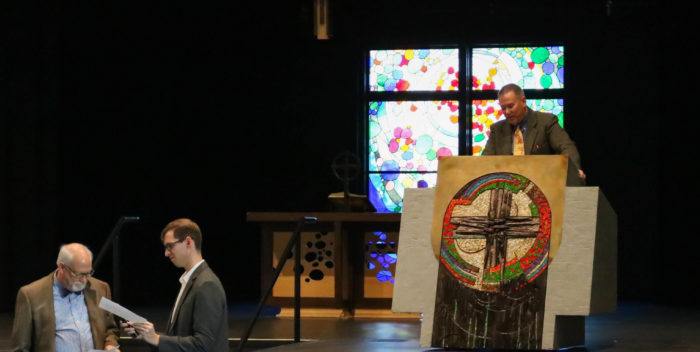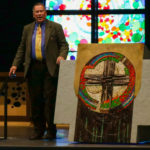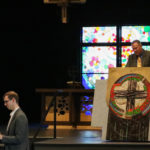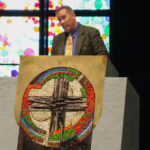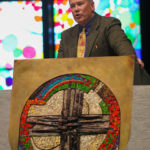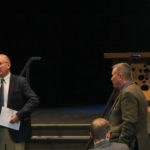Dr. Robert Rosin Continues the Reformation Lecture Series
Dr. Robert Rosin speaks at Concordia’s Weller Auditorium on Monday, Nov. 14. Photo by Anyssa Neustel.
by April Bayer
Students, faculty and Seward community members gathered in Weller Auditorium on Monday, Nov. 14, to listen to Rev. Dr. Robert Rosin deliver his lecture ‘The Reformation Then and Now: Context Counts and Method Matters’ as a part of Concordia’s 500th Reformation Celebration lecture series.
Rosin received his Bachelor of Arts from Concordia Teachers College, River Forest; a Master of Divinity from Concordia Theological Seminary, St. Louis; and a master’s and Ph.D. from Stanford University.
Rosin also served as a research fellow at the Institut für Europäische Geschichte in Mainz, Germany. He joined the faculty of Concordia Theological Seminary, St. Louis in 1982, where he is professor emeritus of theological history. Rosin has also held positions in various boards and offices and is a published author and translator.
Rosin’s lecture focused on the ideas brought about by renaissance humanism and how they impacted Martin Luther and the Reformation as a whole. He began by giving a brief history of the events leading up to the Reformation and provided information about some of the major figures involved.
“A lot of things offer great promise but never pan out, and then you have other things where you have no idea how they’ll turn out in the end,” Rosin said. “The Reformation was one of those (things). Everyone is surprised that it started out as a sort of ‘monkish squabble’…and then turned the world upside down.”
The next part of Rosin’s presentation explained how Luther used debate and publication to express his disagreements with the practices of the Roman Catholic church in his 95 Theses against indulgences and his 97 Theses against scholastic theology.
This was illustrated through the performance of a Monty Python skit by Assistant Professor of Theology Dr. Terence Groth and Assistant Professor of Art Justin Groth which featured two men arguing about nonsense topics.
The remainder of Rosin’s lecture focused on how the ideas of renaissance humanism influenced the work of the Reformation, particularly in the way people approached education, language, translation, history and theology.
“Luther is a Biblical (and) practical theologian who sees the context and makes the connections. He was mindful of history and present circumstances and, as such, he demonstrates the genius of Christianity,” Rosin said. “The message is delivered and…the person (who receives it) goes away and delivers it to others.”
“I’ve always pictured Luther and the Reformation as more of a cultural and social change, but (Dr. Rosin) was arguing for more of (an) academic change…(He) showed Luther had a broader impact on the world,” junior Caleb Stults said.
- Photo by Anyssa Neustel
- Photo by Anyssa Neustel
- Photo by Anyssa Neustel
- Photo by Anyssa Neustel
- Photo by Anyssa Neustel


